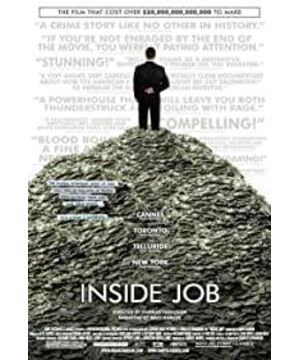The first part begins: Allowing banks to use user savings funds to make venture capital investments. The financial derivatives market is extremely volatile, and attempts have been made to regulate it, but have been blocked by bankers. Bankers rely on this to make money. Then passed the "Unregulated Financial Derivatives Market" Act. Lenders sell mortgages to investment banks, who combine thousands of mortgages and loans (including auto loans, school loans, and credit card overdrafts, among others) into a compound derivative financial product known as a "collateralized debt liability," or for short CDO. The investment bank then sells the CDO to investors. Now, when the property owner repays the loan, the money goes back to investors all over the world. Investment banks pay rating agencies, which evaluate these CDOs, and many of them are rated AAA, the highest possible rating. This makes CDOs as popular as retirement funds, which can only be purchased as high-value securities. This system is dangerous. Lenders don't worry about borrowers' ability to repay their debts and can lend at greater risk. Investment banks also don't care about borrowers' ability to repay. The more CDOs an investment bank sells, the more profitable it is. The grading agency is also actually funded by investment banks and is no longer responsible for the correctness of the CDO's assessment. During this period, all loans are green released. When all subprime mortgages were consolidated into one CDO, many of these CDOs also received AAA ratings. Investment banks actually prefer subprime mortgages because of the higher interest rates, which makes the debtor a victim. Borrowers bought land with huge loans, many of which were made to people who simply couldn't repay them.
The second part of the bubble has countless funds flowing into the securitization chain because everyone can apply for a mortgage. Home sales and house prices are skyrocketing. foam formed. The ratio of bank assets to borrowed assets is called leverage (debt-to-equity ratio). The more borrowed, the higher the leverage. Insurance company AIG sells a large amount of a financial derivative called a "credit default swap" (CDS). Credit default swaps are an insurance mechanism for CDO holders. Investors who have purchased credit default swap products pay AIG a quarterly fee, and if the CDO situation deteriorates (the investment cannot be recovered), AIG promises to compensate investors for losses. But unlike ordinary insurance, speculators can also buy credit default swaps from AIG to insure CDOs they don't own. Because the credit default calling mechanism has not been regulated, AIG does not need to invest a penny to compensate for possible losses. Conversely, AIG pays employees huge cash bonuses right after the contract is signed, but if the CDO situation continues to deteriorate, AIG is stuck and people are actually being rewarded for taking huge risks. After the Wall Street capitalists made money, they used the money to splurge on luxury houses, private jets, drugs, whoring prostitutes and so on. Here's a study showing that spending money and taking drugs stimulate the same parts of the brain. That's the cool trick of the staff at AAA rated credit agencies. "Opinions. They are just opinions". They are merely offering opinions, and such "opinions" should not be overly relied upon.
The third part of the crisis borrowers are not in debt, and the entire food chain begins to collapse. When the crisis broke out, some economic experts or government advisers and so on slipped away. In the end, the misfortune was passed on to the poor at the bottom.
The fourth part of the responsibility is that the executives of large companies basically get out of the way after getting the money. And still retain high salaries and hold positions in the form of consultants, etc. A large number of economic experts in the United States are involved in politics in the form of advisers, who support easy policy, and remain opposed to restructuring after the crisis. This economic force has a significant impact on government decision-making and operations. These people are not only experts and scholars, but also participate in politics, and also serve as directors or consultants of financial-related companies. This is where the essence of the financial crisis feels. The impact of this multi-dwelling person on society is too great. If you can't stop playing, there is still a way out. It's the essential reason for this status quo. Part 5 How bad is the situation? (where we are now?) After the 1980s, economics became stronger and American society became more and more unfair. The financial crisis happened just before Obama was running for president. Obama took aim at Wall Street's greed and lack of regulation, and he proposed risk regulation and increased capital constraints. But by 10 years, the government's financial restructuring plan had not taken effect. There is no restructuring and regulation at all. Because this is the government of Wall Street. The people and institutions that created the disaster are still in power.
View more about Inside Job reviews











